Key takeaways:
- Hospital ministry combines spiritual care and health services, fostering emotional support and hope for patients.
- Long-term volunteering builds strong relationships, providing stability and understanding of patients’ needs while enhancing personal growth.
- Volunteering can be emotionally challenging, leading to burnout and emotional disconnect, yet it also promotes resilience and deep empathy.
- Personal growth through service enhances communication skills and cultural awareness, revealing strengths and areas for improvement in individuals.
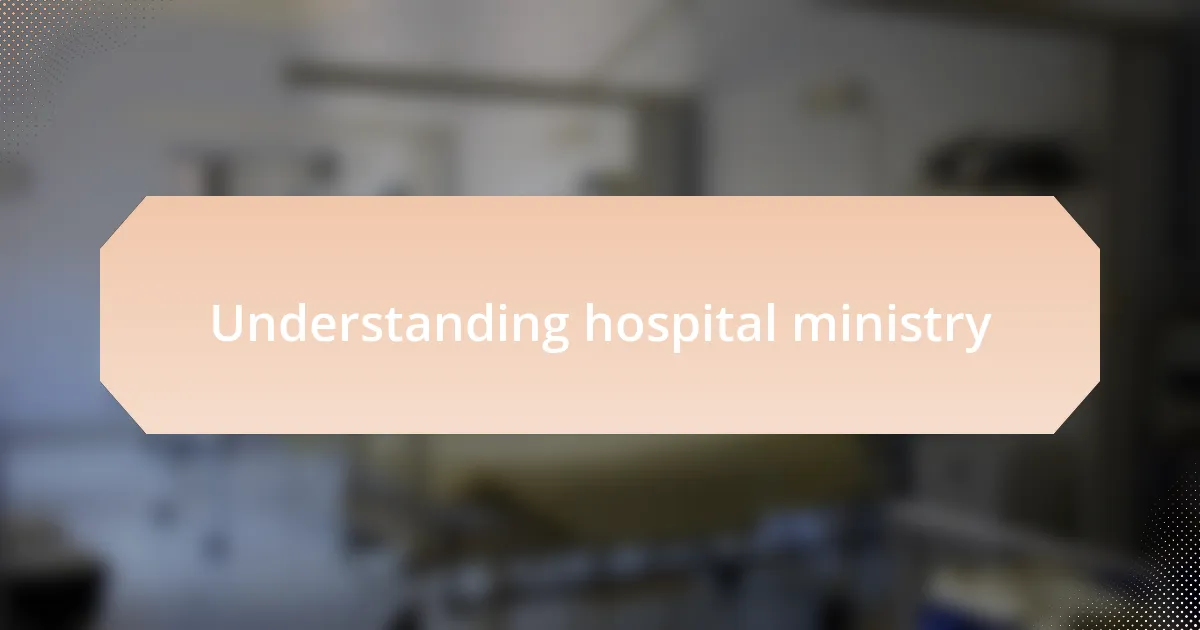
Understanding hospital ministry
Hospital ministry is a unique blend of spiritual care and health services, where faith meets the emotional and physical needs of patients. I remember my first visit to a hospital as a volunteer; the sterile environment was overwhelming, but the genuine smiles I received were a reminder of the healing power of presence. How often do we underestimate the impact a listening ear and a kind word can have on someone feeling lost?
In this setting, chaplains and volunteers often serve as a comforting bridge between medical teams and patients, providing support that transcends clinical treatment. I once sat with a family who was grappling with a difficult diagnosis; sharing their fears and hopes with me, they felt a momentary relief. It struck me then—could this companionship be as critical as any medication they were receiving?
The essence of hospital ministry goes beyond mere visits; it’s about fostering a sense of community and nurturing hope. One evening, I walked through the ward, offering simple prayers and gestures of compassion. I couldn’t help but wonder, how many others have felt the warmth of connection in those bleak moments? This ministry creates a sanctuary where individuals can confront their vulnerabilities and find peace amidst chaos.
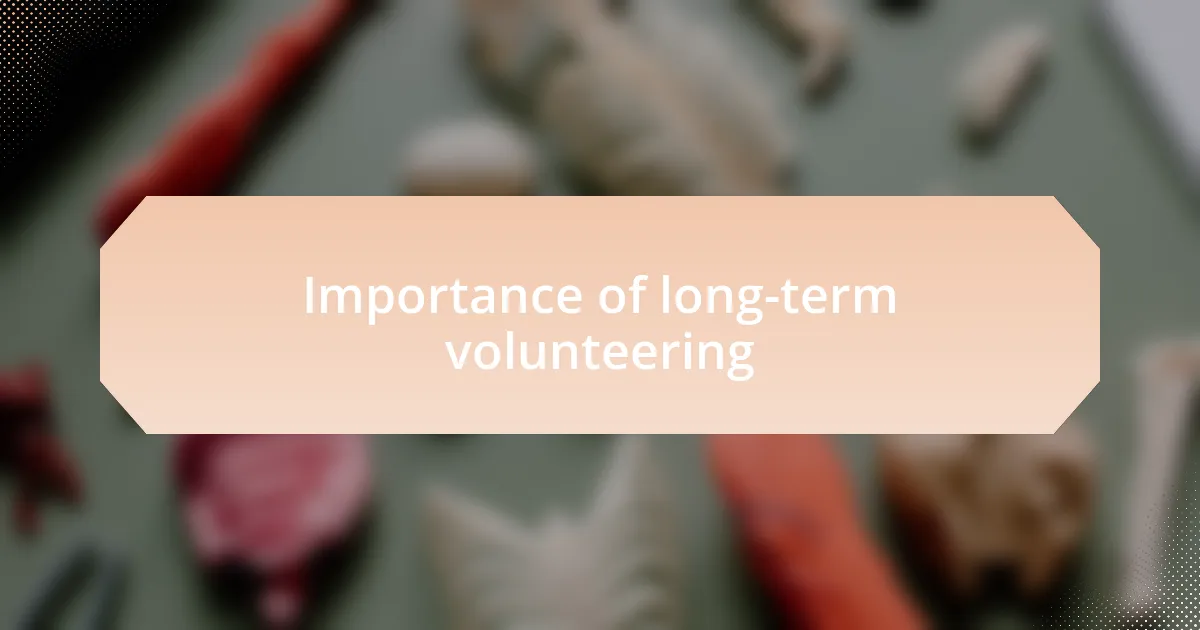
Importance of long-term volunteering
Long-term volunteering possesses a transformative power that short-term commitments often lack. During my time in a hospital ministry, I witnessed how relationships developed between volunteers and patients over extended periods. I recall one elderly man who became a familiar face; as I visited him weekly, we shared stories, laughter, and even tears. Wouldn’t you agree that genuine relationships can create an atmosphere conducive to healing?
Moreover, the stability that long-term volunteers provide can be a lifeline for patients navigating uncertainty. By being a constant presence, I noticed how patients began to anticipate our visits, which, in turn, offered them a sense of hope. It made me reflect—how essential is it for individuals to know that someone cares enough to show up time and again?
Lastly, long-term commitment in hospital ministry allows volunteers to develop a deeper understanding of the patients’ needs and the healthcare environment. I remember the shift in my perspective as I learned not only about patient care but also about the impact of spiritual support in the healing process. In what ways do you think sustained engagement can enhance our ability to serve others effectively?
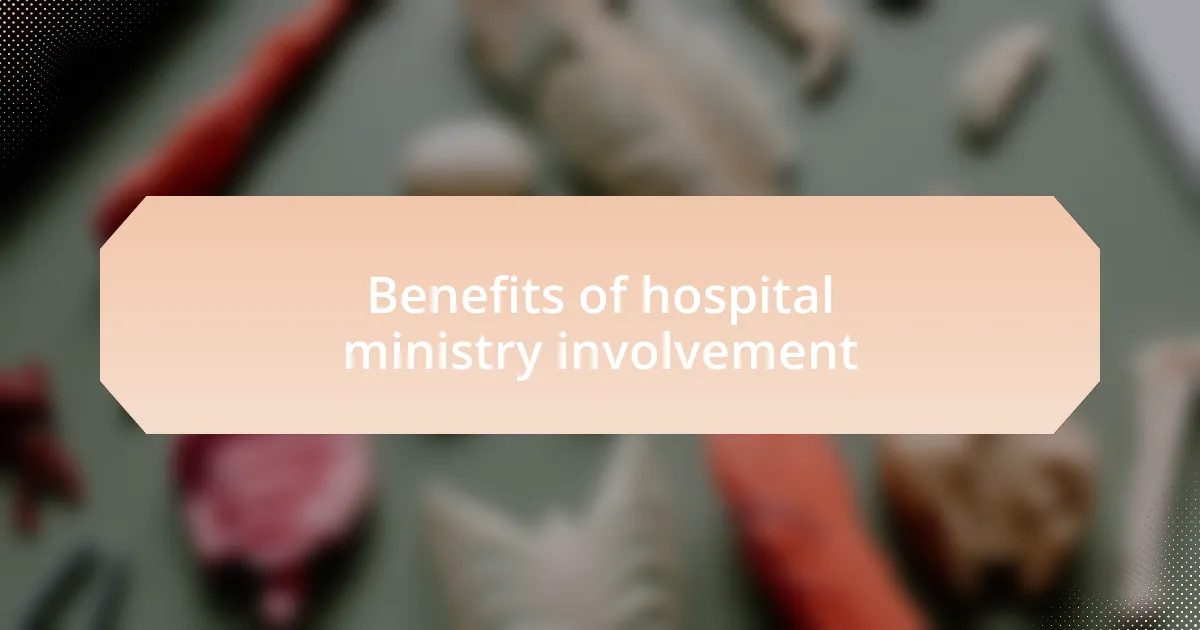
Benefits of hospital ministry involvement
Being involved in hospital ministry brings a unique opportunity for personal growth. During my years volunteering, I learned to navigate complex emotions that come from witnessing both suffering and healing. There were moments when I felt overwhelmed by grief for the patients, yet I also experienced profound joy when I saw their spirits lift after a simple conversation. Wouldn’t you say that such emotional range enriches our own lives in ways we often overlook?
Additionally, engaging in hospital ministry fosters a sense of community among volunteers, staff, and patients. I remember one particular instance where a co-volunteer and I led a small group discussion, which unexpectedly turned into a powerful sharing session for everyone involved. The bonds formed during these times were heartwarming, proving that even in challenging environments, community can flourish. Have you ever experienced that sense of togetherness in a seemingly isolated situation?
Moreover, long-term involvement in hospital ministry often cultivates resilience and empathy. I found myself gradually evolving; situations that once felt daunting became manageable as I learned to face them with compassion. Each patient taught me something new about strength, vulnerability, and the importance of listening. Isn’t it fascinating how much we grow when we open our hearts to others in need?
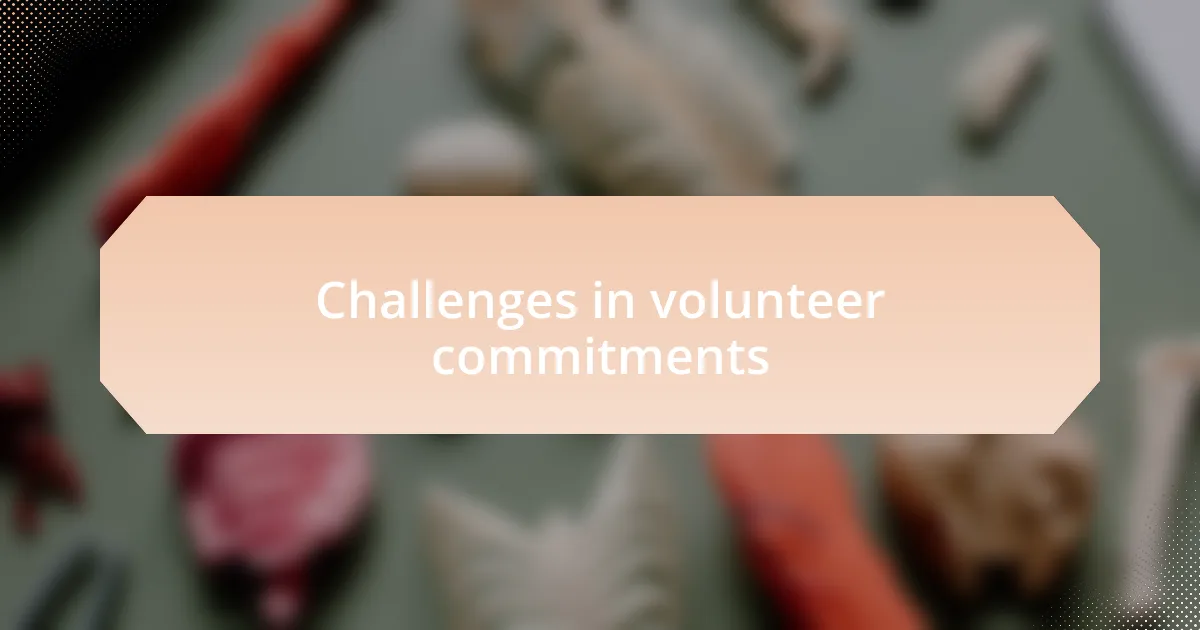
Challenges in volunteer commitments
Volunteering in a hospital setting can be deeply rewarding, yet it also comes with notable challenges. One significant hurdle I’ve faced is the emotional toll of witnessing patients endure pain and suffering. I recall a time when I sat with a family grappling with the impending loss of a loved one. In that moment, the heaviness of sorrow I felt was almost palpable. How do we carry such weight without letting it consume us?
Moreover, long-term commitments can lead to burnout, especially when volunteers juggle multiple responsibilities outside of their service. I remember a period in my own journey when I was stretched too thin, trying to balance volunteering with work and family obligations. It became difficult to maintain the energy and passion I initially had. Have you ever felt that sense of exhaustion that robs you of the joy in what you once loved doing?
Another challenge that often arises is the emotional disconnect that can develop over time. Initially, each patient’s story resonated deeply with me, but as the years passed, I found myself becoming desensitized to these experiences. I sometimes wonder if this numbness is a defense mechanism or a tendency to shield myself from too much pain. Have you ever encountered a situation where you felt your emotional responses dulling? Finding ways to reignite that deep empathy, while safeguarding your own mental health, remains an ongoing journey.
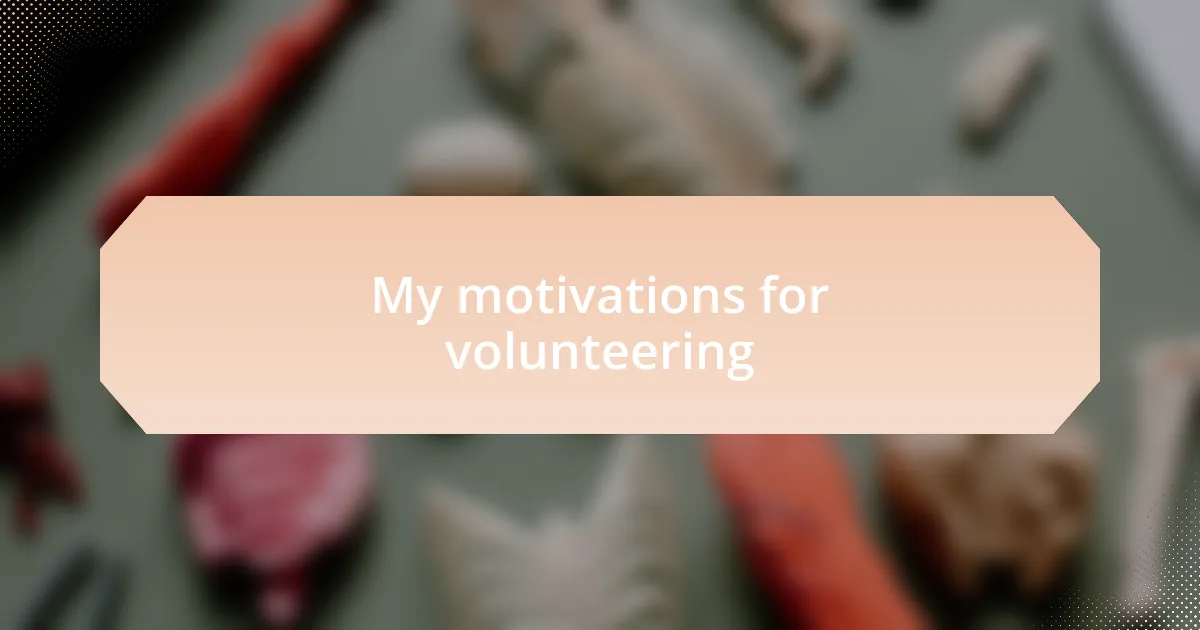
My motivations for volunteering
Volunteering in a hospital has always stemmed from my desire to make a tangible impact on people’s lives. I remember one afternoon spent with an elderly patient who shared her life stories—each word woven with a tapestry of joy and sorrow. That connection felt profound, and it reminded me that my presence could provide comfort and companionship to those who might otherwise feel isolated. Have you ever noticed how a simple conversation can brighten someone’s day?
My commitment is driven not just by altruism, but also by the personal growth that comes from these experiences. Each interaction pushes me to confront my own vulnerabilities—reflecting on my empathy, resilience, and even my fears. For example, after a particularly tough day, I sat down and realized that volunteering challenges me to grapple with emotions that I often push aside. Isn’t it fascinating how giving to others can lead to discovering more about ourselves?
Ultimately, my motivations intertwine deeply with faith and a sense of purpose. I find that my service aligns with my spiritual beliefs, reinforcing the idea that helping others is not just an act but a calling. There are moments of profound insight after I’ve helped someone find their footing in troubled times, leaving me with an overwhelming sense of fulfillment. Have you ever experienced that delightful twist of fate where your efforts create ripples of positive change in someone else’s life?
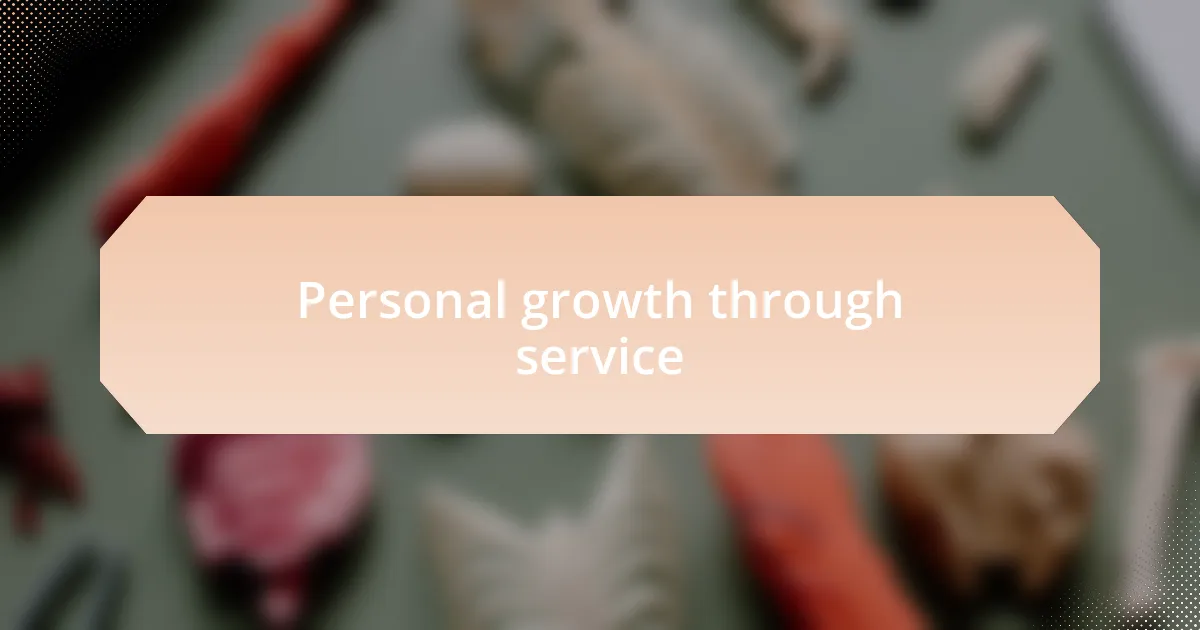
Personal growth through service
When I think about the personal growth I’ve experienced through my service, I’m often reminded of a time I volunteered during a particularly challenging flu season. Amid the chaos, I encountered a young mother who was scared and overwhelmed. As I sat with her, providing support and essential information, I realized that my presence helped me develop a deeper sense of compassion. Have you ever witnessed how being there for someone catalyzes your own emotional maturity?
Through my volunteer experiences, I’ve learned valuable life skills that have transformed how I interact with others. For instance, navigating conversations with patients from diverse backgrounds has heightened my cultural awareness and improved my communication abilities. These skills not only enhance my effectiveness in service but also enrich my personal relationships. How often do we reflect on these seemingly small interactions that leave a lasting impact on our lives?
Each commitment I make is a step in self-discovery. I often find myself pondering how these moments of service reveal my strengths and areas for growth. During one particularly poignant shift, I felt a wave of anxiety about saying the right thing to a grieving family. Engaging in that situation ultimately taught me more about my capabilities, enabling me to grow into a more resilient and empathetic individual. Doesn’t it strike you how service can shine a light on the path of self-improvement?